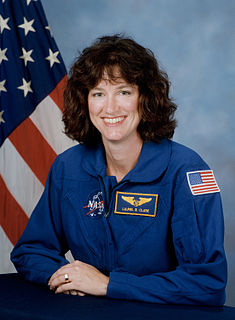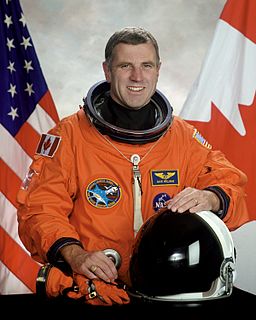A Quote by Laurel Clark
Some things are only capable of being done in space. Examples of that are looking at our Earth from that far away, and understanding the entire processes of storms and weather patterns, and oceans, and coastlines.
Related Quotes
A new consciousness is developing which sees the earth as a single organism and recognizes that an organism at war with itself is doomed. We are one planet. One of the great revelations of the age of space exploration is the image of the earth finite and lonely, somehow vulnerable, bearing the entire human species through the oceans of space and time.
Computers and rocket ships are examples of invention, not of understanding. ... All that is needed to build machines is the knowledge that when one thing happens, another thing happens as a result. It's an accumulation of simple patterns. A dog can learn patterns. There is no "why&rdqo"; in those examples. We don't understand why electricity travels. We don't know why light travels at a constant speed forever. All we can do is observe and record patterns.
This is how space begins, with words only, signs traced on the blank page. To describe space: to name it, to trace it, like those portolano-makers who saturated the coastlines with the names of harbours, the names of capes, the names of inlets, until in the end the land was only separated from the sea by a continuous ribbon of text. Is the aleph, that place in Borges from which the entire world is visible simultaneously, anything other than an alphabet?
We have indeed been out in space, but some are under the illusion that we have been off Earth. In reality humans have never been off Earth. We have always been on a piece of Earth in space. We survive only as long as we can breathe the air of Earth, drink its waters, and be nourished by its foods. There is no indication that as humans we will ever live anywhere else in the universe. Place, too, is continuously being transformed but only within its own possibilities.
On my second space walk, I was riding the Canadarm, heading down toward the payload bay of the space shuttle, and I could see the space shuttle highlighted against the Earth in the background, and there was this black, infinite, hostile void of space. I remember looking down at the Earth and thinking, "Beneath me is a 4½-billion-year-old planet, upon which the entire history of the human species has taken place." That was an incredibly humbling moment, and I had a bit of an epiphany.
It is through our technology that we have been able to fly far away from earth to learn, in truth, how precious it is. It is no coincidence that our awakening to the special nature of our world and to its uniquely balanced environment and its limitations coincided with our first glimpse of earth from outer space, through the eyes of astronauts, television cameras and photographic equipment.
Of all the things we are wrong about, error might well top the list ... We are wrong about what it means to be wrong. Far from being a sign of intellectual inferiority, the capacity to err is crucial to human cognition. Far from being a moral flaw, it is inextricable from some of our most humane and honourable qualities: empathy, optimism, imagination, conviction, and courage. And far from being a mark of indifference or intolerance, wrongness is a vital part of how we learn and change. Thanks to error, we can revise our understanding of ourselves and amend our ideas about the world.
If we can avoid disaster for the next two centuries, our species should be safe as we spread into space. If we are the only intellegent beings in the galaxy we should make sure we survive and continue. . . . Our only chance of long-term survival is not to remain inward looking on planet Earth but to spread out into space. We have made remarkable progress in the last hundred years. But if we want to continue beyond the next hundred years, our future is in space.
All across the world, ...increasingly dangerous weather patterns and devastating storms are abruptly putting an end to the long-running debate over whether or not climate change is real. Not only is it real, it's here, and its effects are giving rise to a frighteningly new global phenomenon: the man-made natural disaster.
































